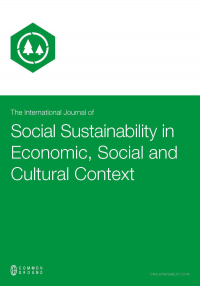Volume 19
Cultural Factors Depicting the Impact of Street Vending on the Quality of Life of Senegalese Households: An Empirical Investigation of Dakar Street Vendors
Fafa Sene, The International Journal of Social Sustainability in Economic, Social, and Cultural Context, Volume 19, Issue 2, pp. 103-122
Volume 18
Reading the Anthropocene through Landscape Archeology: Historical and Contemporary Landscapes of Accumulation in the Netherlands and Lebanon
Katherine Snow, and Sjoerd J. Kluiving, The International Journal of Environmental Sustainability, Volume 18, Issue 2, pp. 1-22
Volume 17
Creating a Sustainable Future: From National Plans to Organizational Strategy
Nina Louw and Chanel Venter, The International Journal of Sustainability Policy and Practice, Volume 17, Issue 2, pp. 9-25
Volume 16
Biomimicry in Sustainable Food and Agriculture
James Bassett, Emma Ho'o, The International Journal of Social Sustainability in Economic, Social, and Cultural Context, Volume 16, Issue 2, pp. 29-45
Volume 15
Nature-Centered Leadership: Challenging the “Rules of the Game”
Spencer Stober, The International Journal of Environmental, Cultural, Economic, and Social Sustainability: Annual Review, Volume 15, Issue 1, pp. 1-13
Volume 14
Interpreting the Social Dimension of Sustainability: Connecting Theory and Community Planning Practice with a Social Determinants of Health Framework
Jacklyn Kohon, The International Journal of Sustainability in Economic, Social, and Cultural Context, Volume 14, Issue 3, pp. 1-19
Volume 13
Operationalising the Ideas of Justice in Forest Governance: An Analysis of Community Forestry and REDD+ Processes in Nepal
Poshendra Satyal, The International Journal of Environmental, Cultural, Economic, and Social Sustainability: Annual Review, Volume 13, Issue 1, pp. 1-19
Volume 12
Implementing Bioremediation Technologies to Degrade Chemical Warfare Agents and Explosives from War Affected Regions in Sri Lanka.
Sithamparanathan, Elackiya, The International Journal of Environmental Sustainability, Volume 12, Issue 3, pp. 1-20
Volume 11
Sustaining African Cities: Urban Hunger and Sustainable Development in East Africa
Andrea M. Brown, The International Journal of Environmental, Cultural, Economic, and Social Sustainability: Annual Review, Volume 11, Issue 1, pp.1-12
Volume 9
A Systematic Search of Trends in Rural Development Research: Type of Research, Originating Regions, and Engagement with Sustainability
Neus (Snowy) Evans, Michelle Lasen, and Komla Tsey, The International Journal of Environmental, Cultural, Economic, and Social Sustainability: Annual Review, Volume 9, Issue 1, pp.1-17
Volume 8
Avenue J: Lessons from the Past and from Nature to Heal Lubbock’s Future
David A. Driskill, The International Journal of Environmental, Cultural, Economic, and Social Sustainability: Annual Review, Volume 8, Issue 1, pp.11-27
Volume 7
Incorporating Community Governance: Planning Sustainable Energy Security
Diane Costello, The International Journal of Environmental, Cultural, Economic, and Social Sustainability, Volume 7, Issue 4, pp.349-366
Volume 6
Social Sustainability and Ecotourism: Rethinking Development for Social and Environmental well-being in the Caribbean
Veronica Dujon, The International Journal of Environmental, Cultural, Economic, and Social Sustainability, Volume 6, Issue 3, pp.181-192
Volume 5
Community Sustainability and Social Justice: Whose Vision?
Diane Costello and Brian Bishop, The International Journal of Environmental, Cultural, Economic, and Social Sustainability, Volume 5, Issue 1, pp.141-160
